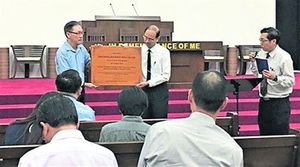Work and leisure are God’s gifts to the human race, yet within Christian churches they are neglected topics and young people receive no clear direction in these areas. Society’s attitude towards them is dominated by a secular and pragmatic outlook. The way people spend their leisure time often reflects the decline of moral and spiritual values in our culture.
Today even Christians are confused. Their approach to work and play often degenerates into this: ‘We worship our work, work at our play, and play during worship’. Christians need to rethink, and rediscover God’s blueprint for these vital aspects of our lives. The Bible provides clear direction on the proper appreciation of work and leisure as originally intended by God.
Work
Work can be defined as ‘the meaningful employment of our time resulting in the fruit of labour’. The Bible asserts the value of industrious work. Solomon said, ‘Whatsoever thy hand findeth to do, do it with thy might; for there is no work, nor device, nor knowledge, nor wisdom, in the grave, whither thou goest’ (Ecclesiastes 9:10).
The Protestant tradition made much of work as a creation ordinance. The Reformers extolled diligence in work as a primary virtue in the Christian life — the famous ‘Protestant work ethic’.
The Puritans in seventeenth-century England emphasised the same theme. William Perkins wrote, ‘Man must live by the labour of his own hands and feed upon his own bread’. Richard Bernard added, ‘Idleness is a great sin, the nurse of all vice’. There was a common adage: ‘An idle mind is a devil’s workshop’.
Work should be viewed as a calling in which the worker is a steward accountable to God (Ephesians 4:1). The goals of work are firstly spiritual (to glorify God) and secondly humanitarian (to serve man and society).
Success?
Today, the purpose and value of work is clouded by many material pursuits. The consumer ethic, coupled with the success ethic of a meritocratic and elitist society, shape our career ethic. People value work as a means to attain success, one of the signs of success being a prestigious career or promotion.
In my own country, the Singaporean dream consists of the five Cs — Condo [apartment], Car, Club, Card and Corporate success. More important to the Christian are the three Cs — our Creator, our Consecration to Christ, and our Crucifixion to the world.
To achieve success, people often deny themselves leisure and the enjoyment of their families and friends. They have a competitive spirit that tramples on others on the way to economic success. Christians ought not to be so, for we have a higher and more spiritual purpose than material gain and power on earth.
Leisure
The concept of leisure is more elusive and difficult to define. Some think of leisure as the antithesis of work and call it non-working time. While this may be true, I find it insufficient and misleading.
Leisure is discretionary time — time that can be used fruitfully to the glory of God apart from the obligation of work, family and society. It is activity positively chosen for personal enrichment.
It is a time for refreshment in various ways — physical, spiritual, intellectual or social. It may involve activities as different as reading a book, going for a walk, or even holding a conversation.
Yet, at a deeper level, leisure is a matter of mental and spiritual attitude rather than just certain kinds of activity. Without a positive attitude, a person simply on leave from work cannot enjoy leisure.
Health
We need to view leisure as an occasion for learning, growth and self-expression — an opportunity for rediscovering life in its entirety. It is a search for repose, creativity and freedom.
It serves many useful functions. Jesus enjoyed leisure with his disciples as a means of relaxation and restoration. In Mark 6:31-32 we read, ‘And he said unto them, “Come ye yourselves apart into a desert place, and rest a while”: for there were many coming and going, and they had no leisure so much as to eat. And they departed into a desert place by ship privately’.
Personally, I treasure the quiet times of reading, exercising, praying and listening to Christian music or messages — or just playing the guitar or fellowshipping with others. It is more than non-work, it is positive benefit for our body and soul.
I believe leisure is essential for a healthy ministry, a healthy mind and a healthy body. If you don’t come apart and rest awhile, you may just come apart!
Take a book and go to the beach or a quiet place to read. Seek the Lord in meaningful moments of life, away from the hue and cry of work and community. Take a break — a holiday — from work from time to time. We need it.
Conscience
Our Creator knows our frame (Psalm 103:14). He is the one who initiated both work and rest. Scripture stipulates that we should labour for six days but on the seventh day we are to rest and worship God. In-built in the Sabbath was the implicit concept of rest, recreation and refreshment. These things still apply to the Lord’s Day, the ‘Christian Sabbath’.
Some leisure activities practised by the world are to be avoided as morally reprehensible (e.g. drinking and gambling). Our choice of leisure must not violate the moral commandments of God or rob us of precious opportunities for devotion to God.
Our leisure pursuits must not be inconsistent with our spiritual convictions of decency and expediency. We must not be a stumbling block to younger Christians in what we allow (1 Corinthians 6:12; 8:9). Whatever we do must be done ‘as unto the Lord’, out of a clear conscience and consecration.
Enjoyment
But these biblical boundaries to leisure activities leave us with an infinite choice of happy relaxations. Sporting activities, whether gentle or vigorous, are useful for a healthy body. It behoves us as responsible Christians to take care of our own bodies, to keep them fit and healthy, sanctified and meet for the Master’s use (2 Timothy 2:20-21).
Likewise, cultural activities and social interactions will keep us mentally and socially fit to do the Master’s will. And so we could continue.
Do not be afraid, then, to relax and to enjoy yourselves in a time of recreation and leisure. Work hard at the right time and learn to relax at the appropriate season. Remember the
Westminster Shorter Catechism:
Question 1
: What is the chief end of man?
Answer
: Man’s chief end is to glorify God and enjoy him for ever.
Whatever you do — including leisure — do it all to the glory of God (Colossians 3:23; 1 Corinthians 10:31).















